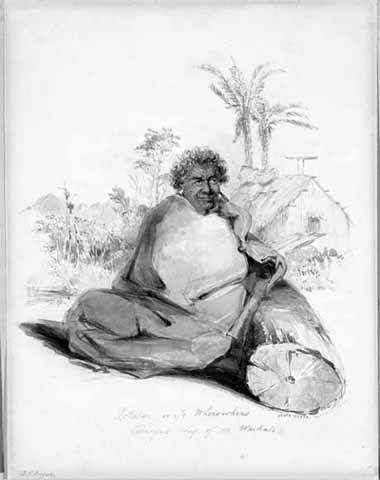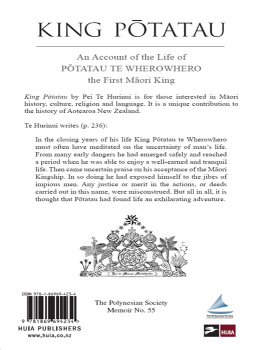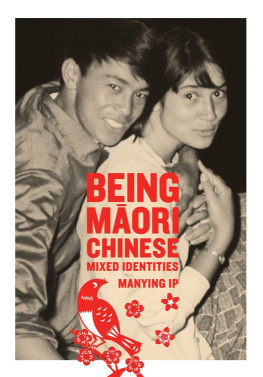The Polynesian Society Memoir No. 55.
First published in 1959 by The Polynesian Society (Inc.)
This edition published in 2010 by Huia Publishers and The Polynesian Society (Inc.)
Huia Publishers.
39 Pipitea Street, PO Box 17335
Wellington, Aotearoa New Zealand
www.huia.co.nz
The Polynesian Society
c/- Mori Studies
The University of Auckland
Private Bag 92019, Auckland
New Zealand
ISBN 978-1-86969-423-4 (print)
ISBN 978-1-77550-122-0 (EPUB)
ISBN 978-1-77550-123-7 (mobi)
Copyright The Polynesian Society (Inc.) 2010
Cover image: King Potatau painting AA 8/6/35, GF Angas Collection,
South Australian Museum Archives.
All rights reserved. No part of this publication may be reproduced,
stored in a retrieval system, or transmitted in any form or by any means, electronic, mechanical, including photocopying,
recording or otherwise, without prior permission of the publisher.
National Library of New Zealand Cataloguing-in-Publication Data
Jones, Pei Te Hurinui, 1898-1976.
King Ptatau : an account of the life of Ptatau Te Wherowhero
the first Mori king / Pei Te Hurinui.
(Polynesian Society memoir; no. 55)
Originally published: Wellington, N.Z. : Polynesian Society, 1959.
Includes bibliographical references and index.
ISBN 978-1-86969-423-4 (pbk.)
1. Potatau Te Wherowhero, King of the Maori, 1775?-1860.
2. Waikato (New Zealand people)Kings and rulersBiography.
3. Maori (New Zealand people)Kings and rulersBiography.
4. Maori (New Zealand people)Wars. 5. New Zealand
HistoryTo 1840. 6. New ZealandHistory1840-1876.
[1. Krero taumata. reo 2. Whakapapa. reo 3. Tpuna. reo 4. Prkau. reo
5. Pakanga. reo 6. Rangatiratanga. reo] I. Polynesian Society (N.Z.)
II. Title. III. Series: Memoirs of the Polynesian Society; no. 55.
993.01092dc 22
Published with the support of the
New Zealand Lottery Grants Board and Creative New Zealand.

Ebook production 2013 by meBooks

Te Wherowhero
George French Angas
AA 8/6/35 G.F. Angas Collection, South Australian Museum Archives.
DEDICATION
This volume is humbly dedicated to
The House of Ptatau
Ko Waikato te Awa;
Ko Taupiri te Maunga,
Ko Te Wherowhero te Tangata.
Waikato is the River;
Taupiri is the Mountain,
And Te Wherowhero is the Man.

The Author
PREFACE
By The Author
This history of Ptatau Te Wherowhero deals with all the outstanding events of his life. The period covered is from about the year 1775 to his death in 1860. In early life he was known by the name of Te Wherowhero, which name we have adopted for Book One of this volume. Later he was given the name of Ptatau; and it was as King Ptatau Te Wherowhero he was proclaimed the first Mori King.
In presenting this work as a contribution to New Zealand history we hope that note will be taken of it together with other accounts. The allocation of the responsibility and the assignment of blame for the events that led up to the Mori Wars of the Eighteen Sixties, which synchronised with the setting up of the Mori King and which have been generally assigned to the Mori King Movement, should be reviewed in the light of the facts given in this account.
Several facts have been recorded by European writers on this subject; notably Sir John Gorst, a fair-minded and cultured English gentleman, and quite a library could be assembled. Many of the outstanding actors: governors, statesmen, soldiers, churchmen, administrators, and Mori Loyalists have had their stories told. These records reveal the perplexities, misunderstandings and difficulties of the times.
History can be too severe in its judgement, and it is our purpose in this volume to place on record and make available to future historians material upon which they can gauge the stress and strain under which, leading Mori actors or rebels, so called, played their parts. We have tried to throw light into the recesses of the Mori mind and over the tribal background of the times, and to reveal the motives which actuated the Mori chiefs in the setting up of a Mori King. The data on which it is based was the result of a painstaking quest and an eager desire to acquire knowledge of the traditions of our Tainui people.
Since the writing of the book was completed on the 4th of June, 1945, all the elders listed at page 279 have passed away. In the course of our investigations, we compiled a table of dates of the five Mori Kings as follows:
MORI KINGS | WHAKAWAHINGA
OR RAISING-UP | DATE OF DEATH |
Ptatau | 2/5/1859 | 25/6/1860 |
Twhiao | 5/7/1860 | 26/8/1894 |
Mahuta | 14/9/1894 | 9/11/1912 |
Te Rt | 24/11/1912 | 1/10/1933 |
Korok | 8/10/1933 |
Before the Centennial celebrations for the founding of the Mori King Movement, which was held at Ngruawhia on the 2nd of May, 1958, the author argued with the Tainui elders that the centennial date should be the 2nd May, 1959. We found ourselves in a minority. We have since made a further search and discovered evidence in Rusdens History of New Zealand that the 1959 date was after all the correct centennial year. In the year 1858 for instance the name Matua (father) was favoured by a large section of the Waikato people. The record of the 1859 date is given in Volume II of Rusdens book (1895: 100-101) from which we quote:
Donald McLean went to the meeting at Ngaruawahia with Wiremu Nera (earlier known as Te Awataia). The main object was to confirm Potatau as king and to erect his flag. War dances were indulged in with savage delight as the lower Waikato and Manukau natives landed from their flotilla of canoes. The majority of the meeting staunchly supported the King movement. Some were moderate adherents. Some opposed it as likely to lead to a war of races. McLeans speech (not recorded by Rusden), unfinished at night, was to be resumed in the morning, but the Maoris were slow to assemble, and as McLean heard that the flagstaff was to be reared that daya ceremony he desired not to seehe bade farewell to Potatau. The flagstaff was erected (29th May) and named after Potataus ancestor Te Paue (sic)Tapaue. Potatau on that day spoke publicly for the first time, and spoke in friendly terms of the English.
Confirmation of the date of death of Ptatau, which was also the subject of argument prior to the Centennial celebrations, was recorded by Rusden in the same volume:
Two days before the attack on Puketakauere (in Taranaki, at the southern end of the town of Waitara) Potatau died. The son of Potatau, called at the time Matutaera, but who subsequently took the name of Tawhiao, was chosen king. (














